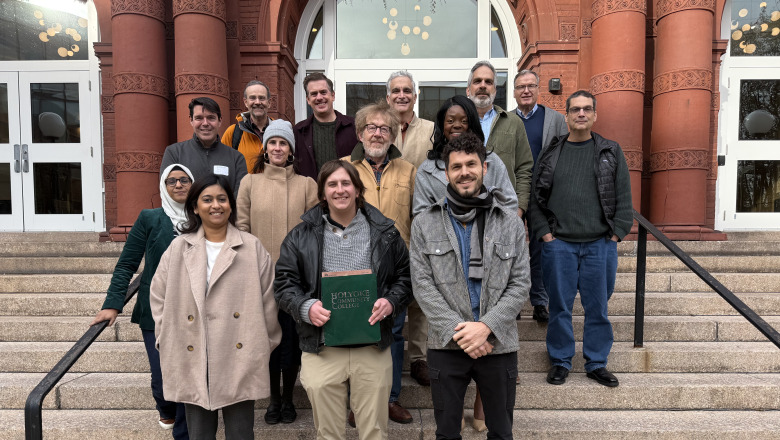
How can universities and their students be a part of the solution to the dearth of community journalism?
That was one of many important topics discussed as 15 faculty and staff representing Fitchburg State University, UMass Amherst, Worcester State University, Brandeis University, Holyoke Community College, Suffolk University, Eastern Connecticut State University, the University of Rhode Island, the University of Hartford and the University of Vermont assembled at the Fitchburg State campus for a day of local news and academic collaboration.
Sponsored by the University of Vermont's Center for Community News (CCN), the training and organization session achieved two key goals: to brainstorm and share actionable ideas for student contributions to local media, and to build and strengthen vital community partnerships.
CCN is a nonpartisan organization that was established in July 2022 to grow and strengthen university-led reporting programs across the U.S.
“These programs are a triple win, students get real experiences, building their networks and clips, local media gets professionally edited content and universities meet their mission to support their communities,” said Director of CCN at the University of Vermont Richard Watts. “But it starts with faculty – and it was great to be in a room with such smart, innovative and entrepreneurial faculty committed to their students and local news. Thanks to (Fitchburg State Associate Professor of English Studies) Wafa (Unus) and Fitchburg State for pulling this together.”
Brandeis University’s Journalism Program Director Neil Swidey said that there’s a real benefit to people realizing that they are not doing this work all alone.
“There are other people out there with similar ambitions and hopefully we can save some people some time and frustrations by creating these mechanisms for sharing ideas and wisdom,” said Swidey. “Journalism is the cornerstone to democracy.”
Swidey said the core principles of journalism are essential for an informed populace to understand what is happening in their communities and to drive better decisions.
Partnerships between local media and journalism students are a win-win, said Suffolk University Associate Professor of Practice in the Communications and Journalism Department Charles St. Amand.
“It’s a two-way street,” said St. Amand, a journalism veteran and former editor at the Sentinel & Enterprise newspaper in Fitchburg from 2010-2017. “The students get clips in a professional setting and the local newspapers are able to maybe put their short-staffed staff on more substantial journalism that the community needs.
“We don’t owe it to the (media) owners, we owe it to communities that aren’t being served,” he said.
That work has already moved forward at Fitchburg State by partnering with local media outlets, including Fitchburg Access Television, and the Sentinel & Enterprise and the Harvard Free Press newspapers.
“I certainly feel a sense of pride in the work that we’ve done,” said Unus. “Our students are fantastic in their ability to adapt to their circumstances. In part I think our students are really best situated to do this because they have lived experiences that align with a lot of the social challenges that we’ve facing. In journalism, that’s always a positive to have people that have real lived experiences within the things that we need to cover, within the social issues or the civic issues that we need to address.”
Unus said that it is wonderful that Fitchburg State has established partnerships with several local media outlets, but it’s born out of need.
“It’s hard to come into Fitchburg and not feel the absence of local news,” she said. “Partnerships have been slow to develop and we’re still formalizing them, but I think if Fitchburg State can do one thing in this space, I think it is to be a leader because the city requires it and needs it so desperately. It’s geographically important, and the student body is very much attuned to the needs that we all feel socially and civically. I think we are well situated to be a leader in this space, and I think we’ll get there.”
Watts said that the core to this mission is that universities are giving students these experiences in the curriculum.
“It’s really less about training students to be journalists than helping students be better citizens,” said Watt. “You can structure assignments that students can do that also meet local news needs.”
Watts stressed that student reporters are not replacing seasoned local beat reporters.
“They should never think about us as somebody that they can totally count on,” said Watts. “These are stories that they’re never going to get to, all those community fabric stories that make such a difference in their community but they just can’t get to them. First and foremost, our responsibility is to our students to give them this rich experience, and we’re contributing to local news.
“We’re not trying to save journalism, save what once was, we’re trying to invent what comes next,” he said.